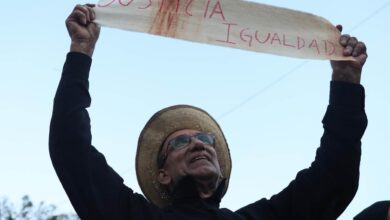This is the power that soccer has in Latin American politics
In Latin America, soccer has been used as a political tool. Find out here more about it

The Uruguayan writer Eduardo Galeano, in his book El fútbol a sol y sombra, exposes the beauty of this sport and the importance of it in the world society. With some traces of poetry and art, Galeano makes it clear that soccer is more than just a sport, even calling it a "god". Of course, being a "deity", this sport refers to moments that have been marked in history by its power over the politics and the social order of several nations. Galeano refers to the case that occurred at the end of the 20th century in Italy.
Leer en español: Este es el poder que tiene el fútbol en la política latinoamericana
In 1994, the then owner of AC Milan, Silvio Berlusconi, based his presidential campaign on soccer. "Silvio Berlusconi promised that he would save Italy as he had saved Milan, the super team champion of everything, and the voters forgot that some of their companies were on the verge of ruin," said the writer.
Likewise, the Colombian journalist and statistician Hugo Ocampo Villegas explained that "soccer has been able to summon heads of state, military men who used some World Cups for their image, even the Pope himself." Similarly, he assured that "soccer has been a promoter of national pride," as well as "a source of political and sports diplomacy, even the origin of some incidents between countries."
In other occasions, the sports king had great incidence in the decisions and in the political reality of some Latin American countries. Here we present you two historical facts that took place in Argentina and Colombia.
Videla and the 1978 World Cup in Argentina
In the 70s, Argentina was one of the Latin American countries victims of a military dictatorship resulting from the so-called Condor Operation. According to BBC, the plan aimed to undo all nascent communist ideology in the Southern Cone nations, with the United States as one of the main sponsors. "What is certain is that such a plan was only possible in the framework of the Cold War and the anti-communist fervor of the military regimes in Latin America," the newspaper said.
However, in the late 70s, military strategies were not powerful enough to strengthen the far right in power. Because of this, the Argentine dictator Jorge Videla decided to go for the organization of the 1978 World Cup, the same one that the Argentine National Team won.
En 1978, Videla se empeñó en sacar adelante (y ganar) la Copa Mundial de Argentina, todo para mostrar al mundo un país sin represión ni corrupción. "El deporte siempre fue una herramienta útil para ocultar –por un rato- maniobras políticas ilegales", ya sea fútbol o #Dakar pic.twitter.com/Nq3u8ndPPf
— Gustavo Alejandro CC (@G_Ale_XII) 11 de enero de 2018
"While the goals are shouted, the screams of the tortured and the murdered are extinguished," said Estela de Carlotto, president of the organization Abuelas de Plaza de Mayo, victims of the dictatorship. While in the soccer stadiums the game was lived with passion, in the streets hundreds of thousands of Argentines suffered the ravages of violence and social repression.
Corruption was another of the main characters in this story. According to El Clarín, 700 million dollars were used by the Argentine government to dissipate the painful reality experienced in Argentina for a few weeks. In addition to other "cents" used in matches of matches, such as the one that faced the home team against the team of Peru.
In the semifinals, Argentina had to win by a difference of four goals to a Peruvian team that in five games had only received six goals. The end of the match left a score of six goals to zero and Argentina as a finalist of their own cup.
"Videla's Argentina agreed with Francisco Morales Bermúdez, dictator of the time in Peru, to deliver two ships full of wheat and, in addition, to take charge of 13 politicians from his country deported to Buenos Aires, provided that the red and white team allowed the victory albiceleste," detailed the Sport newspaper.
Colombia: the triumph of democracy
For the 1962 World Cup in Chile, the Colombian National Team was one of the debutants who went with the illusion of simply having a good presentation. At that time, the soccer of national teams was not seen yet as something spectacular in the coffee country.
In fact, such apathy was such to such tournaments that even President Alberto Lleras Camargo confused soccer with basketball when he said goodbye to the National Team, before going to Chile. "The day we went to Chile, the president told us: 'Boys, do well and score lots of hoops,'" said Efrain "Cayman" Sanchez.
As Hugo Ocampo said: "Soccer has managed to establish itself, through the years, in sophisticated international politics" and the 1962 World Cup is a clear example of this. In the Colombian government, the attitude changed as soon as they realized that two of the three teams the team would face in the group stage were communists: the Soviet Union and Yugoslavia, as well as Uruguay.
The first game against the Uruguayans ended in a 2-1 Colombian defeat, which was insignificant, knowing that the next match against the USSR was the decisive one. On June 3, 1962, Colombia reached a historical and heroic four-goal equalizer against the Soviet Union, or what is the same, a victory of capitalism against communism.
Junio 3 de 1962, el primer día que Colombia celebró en un Mundial pic.twitter.com/Y9M7l9OalK
— EL TIEMPO (@ELTIEMPO) 3 de julio de 2014
"It is a triumph of democracy over totalitarianism (…) I hope that freedom will triumph over slavery next time," said the elect president of 1962, Guillermo León Valencia.
What for the world of soccer was only a draw in the history of the world, for the Colombian people represented a moral victory over a nation that represented everything that was not wanted to be in America. Who says that the Cold War had no impact on Latin American politics?
LatinAmerican Post | Christopher Ramírez Hernández
Translated from "Este es el poder que tiene el fútbol en la política latinoamericana"
Listen this article





